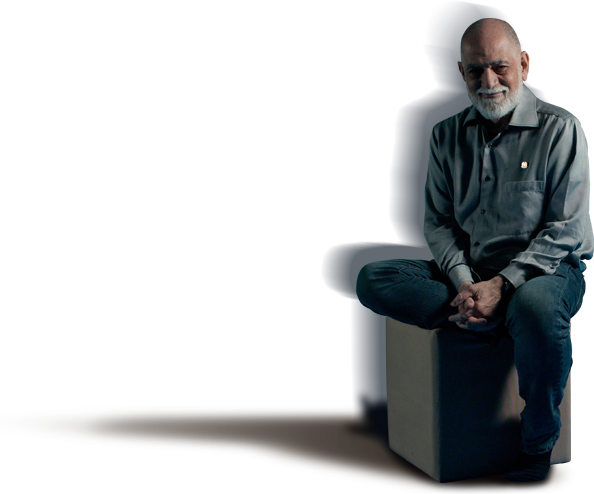Dear DeRose,
We are proud that one important magazine made another article about DeRose Method London.
I want to share this with our readers, sorry for my short text but I am packing up the luggage to our workshop in London!
And here is the front page!
Gustavo Cardoso
Director of DeRose Method London Representative
Author: Gustavo Cardoso
When you are in the practice room facing your DeRose Method instructor you probably do not realize the amount of time and effort they have invested to arrive where they are now.
They all started exactly like you, sitting in the practice room, enjoying what they were doing. In my case, when I was a student I could not think of anything but the next class with my instructor Prof. Leticia Ziebell, today living in Portugal.
When I decided to become an instructor the training was less formal than it is today. More akin to that of the Indian monasteries, where all the knowledge comes from the Master and it is up to the disciple to accept it or not. In the Indian vision of the discipleship, if the disciple does not agree with what is being taught he is entitled to leave, but never to question, ask why, or refuse to do what the Master has prescribed.
Today, in order for a candidate to start their training they must pass an examination in front of a jury of three members. If they are approved at this stage, they will carry on to take a test on general knowledge.
Having passed this, the first stage of the training involves extensive reading covering subjects such as philosophy, asana, pránáyáma, history and the genealogy of the million year old philosophy that constitutes the Method. In this stage the instructor must write essays about various subjects as well as produce a final thesis on a topic of their choice that is, of course, related to our philosophy and coherent with its roots. This is just the theoretical side!
At the same time the instructor must be working on the physical and practical aspects of the training. They must create their own three to five minute choreography, respecting a series of technical facets such as didactic angles and the execution of the exercises among many others. The instructor must memorise the name of over 2000 ásanas, 108 mudrás, 54 breathing exercises, among other techniques, as well as knowing how to execute them all in perfection. Their knowledge of the ásanas for example, is tested through an ásanas draw. The instructor must be able to execute to perfection any of the randomly chosen ásanas.
In order to become an instructor, the candidate must finally assemble a complete class within exactly twenty minutes filled with theory, eight parts, a choreographic sequence, and the many details it implies, failing to present within this time limit has severe penalty.
Both the theoretical and practical aspects however are worthless if the candidate does not show that they value and respect the tradition in which the Method is rooted and its vast family, the egregora of the method.
Such respect is evaluated through the candidates attitudes toward their instructors in various scenarios where they are required to surpass themselves. It is under difficult or even extreme situations that one’s true value is exposed. For this reason, sometimes the teacher must play a role generating stress. A very common phrase we know is, “only when we hit strongly a bell can we see the quality of its metal”.
Finally, the candidate is examined at one of the Federations of the DeRose Method, by a jury of three more experienced instructors who will evaluate everything the candidate has learned as well as their attitude.
Our goal is to train the instructor sitting in front of you to have deep philosophical, practical and theoretical knowledge as very few do, after completing an intensive one year training followed by four years under the tutorship of a more experienced DeRose Method instructor.
In a world that every day brings things forward in an increasingly quicker way, I would not hesitate to state that the instructors trained by this school are oceans away from this tradition. This is why when I sign the authorisation form for any instructors trained by me, I am sure that they will be approved by the examination jury. Their readiness becomes apparent and can be clearly felt during their classes, in a philosophical discussion or even in their behaviour, ethically beyond reproach, since any fault will result in a notice and any repeated fault in irrevocable expulsion.
For these reasons we are proud of what we do and we do not have reservations when station the following: When you are in the practice room or in the changing room, at the DeRose Method school, you are with the finest professionals you could have before you.
All the best. Join me next week
Text originally published at DeRose Method London
http://www.youtube.com/watch?v=jStj1ApcVoY
O sucesso na profissão
Domingo, dia 10 de Abril vamos ter um curso na unidade Londres com o Comendador DeRose.
Me intriga que alguns instrutores continuem sem dar certo e a maioria dê muito certo. Neste dia de domingo vamos decorrer sobre algo que não e comumente visto na rede.
O que la sera falado, foi criado por DeRose e aprimorado pelo Conselho Administrativo e vale ouro.
Se quiser inscrever-se, por favor contacte a instrutora Sônia Ferreira no telefone: 00 (xx) 44 207 373 70 70.
Contamos com a presença de todos.
Mestre, como vai? Muito bom te reencontrar no fim de semana. Envio abaixo um texto bem interessante, do Hunter S. Thompson – um malucão que, como muitos dos malucões, tinha boas idéias. Me fez pensar, e me lembrei do relato do Prof. Gustavo Cardoso.
Beijos, e até o sádhana!
“Security … what does this word mean in relation to life as we know it today? For the most part, it means safety and freedom from worry. It is said to be the end that all men strive for; but is security a utopian goal or is it another word for rut?
Let us visualize the secure man; and by this term, I mean a man who has settled for financial and personal security for his goal in life. In general, he is a man who has pushed ambition and initiative aside and settled down, so to speak, in a boring, but safe and comfortable rut for the rest of his life. His future is but an extension of his present, and he accepts it as such with a complacent shrug of his shoulders. His ideas and ideals are those of society in general and he is accepted as a respectable, but average and prosaic man. But is he a man? has he any self-respect or pride in himself? How could he, when he has risked nothing and gained nothing? What does he think when he sees his youthful dreams of adventure, accomplishment, travel and romance buried under the cloak of conformity? How does he feel when he realizes that he has barely tasted the meal of life; when he sees the prison he has made for himself in pursuit of the almighty dollar? If he thinks this is all well and good, fine, but think of the tragedy of a man who has sacrificed his freedom on the altar of security, and wishes he could turn back the hands of time. A man is to be pitied who lacked the courage to accept the challenge of freedom and depart from the cushion of security and see life as it is instead of living it second-hand. Life has by-passed this man and he has watched from a secure place, afraid to seek anything better What has he done except to sit and wait for the tomorrow which never comes?
Turn back the pages of history and see the men who have shaped the destiny of the world. Security was never theirs, but they lived rather than existed. Where would the world be if all men had sought security and not taken risks or gambled with their lives on the chance that, if they won, life would be different and richer? It is from the bystanders (who are in the vast majority) that we receive the propaganda that life is not worth living, that life is drudgery, that the ambitions of youth must he laid aside for a life which is but a painful wait for death. These are the ones who squeeze what excitement they can from life out of the imaginations and experiences of others through books and movies. These are the insignificant and forgotten men who preach conformity because it is all they know. These are the men who dream at night of what could have been, but who wake at dawn to take their places at the now-familiar rut and to merely exist through another day. For them, the romance of life is long dead and they are forced to go through the years on a treadmill, cursing their existence, yet afraid to die because of the unknown which faces them after death. They lacked the only true courage: the kind which enables men to face the unknown regardless of the consequences.
As an afterthought, it seems hardly proper to write of life without once mentioning happiness; so we shall let the reader answer this question for himself: who is the happier man, he who has braved the storm of life and lived or he who has stayed securely on shore and merely existed?”
Hunter S. Thompson (1955)
Mestre! Saudade de compartilhar ideias por aqui…
Este post é muito interessante, cada vez que leio algo parecido penso que a maioria de nossas dores são o reflexo de insatisfações e somatizações de diversas ações ao longo da nossa vida. A humanidade busca algo que seja imediato e logicamente, “não viemos a este mundo para nos banhar em água de rosas”. Alcançar a consciência e autonomia para nos analisarmos com objetividade requer maturidade e equilíbrio. Para reforçar te envio o vídeo em anexo que indaga: Qual etiqueta gostaríamos de usar? http://www.youtube.com/watch?v=Wv49RFo1ckQ&feature=player_embedded
Um abraço forte!
Lu
Unidade Centro Cívico – Curitiba – PRwww.derosecentrocivico.org
Bom dia, Mestre!
Topei com este vídeo. Mostra a importância dos exemplos dados pelos pais na educação de seus filhos. Que vai de encontro ao que preconizamos, de que devemos ensinar através do exemplo, e não através da doutrinação!
Como é grande a responsabilidade daqueles que se propõem a ensinar qualquer coisa, não?
E como é bom ter um Mestre para nos ajudar neste caminho!
Um abração do Claus.
Segue o link para assistir no youtube:
http://www.youtube.com/watch?v=TPn3ULrTQAY
Beijão!
_______________
Bom dia, Mestre!Na mesma linha deste comercial, este outro me arrepia toda vez que assisto:
http://www.youtube.com/watch?v=7d4gmdl3zNQ
Um forte abraço,
Danilo Chencinski Unidade Vila Mariana









